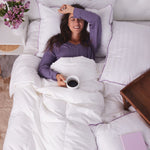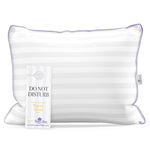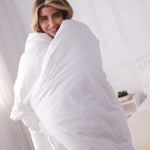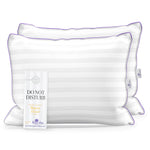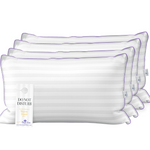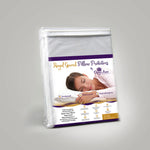You have no items in your shopping cart.

We’ve all heard the term “beauty sleep,” but how much truth is there in the expression? Does better sleep really improve your beauty? Science has now told us that it may at least improve people’s perception of your beauty. A study published in the well-respected scientific journal The BMJ, once known as The British Medical Journal, gives us some surprising insights into the effects of sleep and perception of attractiveness. The authors of the study found that “sleep-deprived people appear less healthy, less attractive, and more tired compared with when they are well rested.” In this blog post, we’ll take a look at the study and how they came to their conclusions.
The Setup
The researchers had 23 participants in the study. There was about an equal number of men and women in the study. The test subjects were photographed under two separate conditions. In the ideal condition, they slept for eight hours and were photographed seven hours after waking. In the second condition, the participants were restricted to five hours of sleep and photographed after 31 hours of being awake.
Strict controls were placed on the photographs as well. They were all shot under similar lighting conditions. Participants were told to wear no makeup and to keep their hair down. Those with long hair had it combed back so as not to obstruct the face. Five or six photographs of each person were taken for each of the two sleep conditions. An impartial viewer picked the most typical photo from each of the two series of photos. All of these controls helped to ensure that the differences in appearance between the two photos came as reasonably as possible only from the differences in sleep.
The Survey
Researchers then showed the series of photographs to 65 impartial observers who were not aware of the goals of the study. The scientists wanted to see how the observers viewed the health, attractiveness, and tiredness of the test subjects with a good nights sleep versus when they had poor sleep. Because they didn’t want the observers to see the word ‘tired’ and prime themselves to think one of the sets of photographs to be sleep deprived, the photos were shown twice. The first time, observers rated on health and attractiveness and the second time they rated for tiredness.
For each of the two sessions, the observers were shown the sleep deprived and well-rested versions of the photos for each study subject. The photographs were randomized, however, so each set of photos contained a mixture of each. To further aid in getting as objective an opinion as possible, the observers took a break between viewing the first set of photos and the second set for each session. During the intermission, the observers were given a memory exercise to focus their memory on something else and help them forget the photographs that they were shown. All of these controls help to ensure that the observers are giving an objective opinion on the faces and that they have not figured out the goal of the study as doing so may bias their responses.
Results
On average, the perception of healthiness declined six percent for the sleep-deprived photos versus their matching well-rested photos. Perception of attractiveness declined four percent for sleep deprived versus well rested. Unsurprisingly, the perception of tiredness changed the most, increasing 19% for the sleep deprived versus the well rested. Additionally, those photos that were rated as the most tired also showed the largest difference in perceptions of health and attractiveness as well.
The researchers believe that the effects would be even greater in real life interactions compared to the static photos. A person’s behavior changes when they are sleep deprived as well as subtle cues such as blink rate and duration. An observer would likely pick up on these cues and determine that the person is tired. As the experiment showed, increased perception of tiredness decreased the perception of health and attractiveness.
Our customers tell us over and over how much our luxury bed pillows have improved their sleep. If you’re ready to get a little more of your own beauty sleep, visit Queen Anne Pillow online and find the luxury pillow that’s right for you!

We’ve all heard the term “beauty sleep,” but how much truth is there in the expression? Does better sleep really improve your beauty? Science has now told us that it may at least improve people’s perception of your beauty. A study published in the well-respected scientific journal The BMJ, once known as The British Medical Journal, gives us some surprising insights into the effects of sleep and perception of attractiveness. The authors of the study found that “sleep-deprived people appear less healthy, less attractive, and more tired compared with when they are well rested.” In this blog post, we’ll take a look at the study and how they came to their conclusions.
The Setup
The researchers had 23 participants in the study. There was about an equal number of men and women in the study. The test subjects were photographed under two separate conditions. In the ideal condition, they slept for eight hours and were photographed seven hours after waking. In the second condition, the participants were restricted to five hours of sleep and photographed after 31 hours of being awake.
Strict controls were placed on the photographs as well. They were all shot under similar lighting conditions. Participants were told to wear no makeup and to keep their hair down. Those with long hair had it combed back so as not to obstruct the face. Five or six photographs of each person were taken for each of the two sleep conditions. An impartial viewer picked the most typical photo from each of the two series of photos. All of these controls helped to ensure that the differences in appearance between the two photos came as reasonably as possible only from the differences in sleep.
The Survey
Researchers then showed the series of photographs to 65 impartial observers who were not aware of the goals of the study. The scientists wanted to see how the observers viewed the health, attractiveness, and tiredness of the test subjects with a good nights sleep versus when they had poor sleep. Because they didn’t want the observers to see the word ‘tired’ and prime themselves to think one of the sets of photographs to be sleep deprived, the photos were shown twice. The first time, observers rated on health and attractiveness and the second time they rated for tiredness.
For each of the two sessions, the observers were shown the sleep deprived and well-rested versions of the photos for each study subject. The photographs were randomized, however, so each set of photos contained a mixture of each. To further aid in getting as objective an opinion as possible, the observers took a break between viewing the first set of photos and the second set for each session. During the intermission, the observers were given a memory exercise to focus their memory on something else and help them forget the photographs that they were shown. All of these controls help to ensure that the observers are giving an objective opinion on the faces and that they have not figured out the goal of the study as doing so may bias their responses.
Results
On average, the perception of healthiness declined six percent for the sleep-deprived photos versus their matching well-rested photos. Perception of attractiveness declined four percent for sleep deprived versus well rested. Unsurprisingly, the perception of tiredness changed the most, increasing 19% for the sleep deprived versus the well rested. Additionally, those photos that were rated as the most tired also showed the largest difference in perceptions of health and attractiveness as well.
The researchers believe that the effects would be even greater in real life interactions compared to the static photos. A person’s behavior changes when they are sleep deprived as well as subtle cues such as blink rate and duration. An observer would likely pick up on these cues and determine that the person is tired. As the experiment showed, increased perception of tiredness decreased the perception of health and attractiveness.
Our customers tell us over and over how much our luxury bed pillows have improved their sleep. If you’re ready to get a little more of your own beauty sleep, visit Queen Anne Pillow online and find the luxury pillow that’s right for you!


 Justin Mock
Justin Mock
